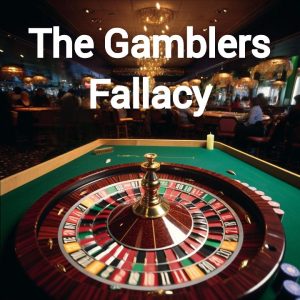Ad Disclaimer!
BMC is an affiliation website. We help you find gambling sites where you can play with real money.
Many or all of the products and brands featured here are from our partners who compensate us. This may influence how the product or brand appears on a page. However, this does not influence our evaluations. Our opinions are our own.
The information on this page, including operator and game details, is updated regularly but subject to change.
Boku online casino sites and gambling are a popular activity enjoyed by millions of people worldwide. At times it can be an entertaining and thrilling experience, but it can also be a dangerous one if players are not aware of the risks involved. One of the most significant risks associated with gambling is the gamblers fallacy, a term you may not have heard of but most likely fallen victim to.
A lot of the time you will likely feel that you are in full control of your gambling and are making completely logical decisions. But in reality this is a common misconception, as we all have a cognitive bias that can have serious consequences on our finances.
So below, we will discuss the gamblers fallacy in detail, explaining what it is, why it is dangerous, and steps you can take to avoid it.
Understanding the Gamblers Fallacy
 So what exactly is it? The gamblers fallacy is a common belief among gamblers that occurs when people believe that previous events can influence future outcomes, even when there is no logical connection between the two. This fallacy is particularly prevalent with casino players, where they often believe that the outcome of one game or hand will influence the outcome of the next. Such as believing your odds of winning will diminish because you have already won frequently, or they will increase because you haven’t been winning.
So what exactly is it? The gamblers fallacy is a common belief among gamblers that occurs when people believe that previous events can influence future outcomes, even when there is no logical connection between the two. This fallacy is particularly prevalent with casino players, where they often believe that the outcome of one game or hand will influence the outcome of the next. Such as believing your odds of winning will diminish because you have already won frequently, or they will increase because you haven’t been winning.
For example, suppose a player has lost several games in a row. In that case, they may believe that they are “due” for a win, leading them to continue playing even when the odds are against them. Similarly, players may believe that a particular number or colour is “hot” or “lucky” and continue to bet on it even when there is no statistical evidence to support their belief.
The cognitive biases that contribute to the gamblers fallacy include the law of small numbers and the hot hand fallacy. The hot hand fallacy is the most common, which is the belief that a player’s success will continue even when it is purely due to chance.
Why the Gamblers Fallacy is Dangerous
If this way of thinking when gambling sounds familiar, as it’s the way you tend to think, you may be wondering if it is a dangerous mind-set. Sadly the answer is a resounding yes.
The gamblers fallacy can be dangerous for several reasons. It can lead players to continue playing even when the odds are against them, or it can lead players to make irrational decisions based on their beliefs, rather than statistical evidence. For example, a player may continue to bet on a particular number or colour in online roulette, believing that it is “due” for a win, even when the odds of winning are low.
This type of decision-making can be particularly dangerous in games with high stakes, such as boku poker or blackjack, where the player’s decisions can have a significant impact on their chances of winning. It can also subsequently lead to significant financial losses.
Real-world examples of the negative consequences of the gamblers fallacy can be found in the Monte Carlo fallacy, which occurred in 1913 at the Monte Carlo Casino in Monaco.
In this case, players believed that the roulette wheel was biased towards black, as it had not landed on red for 26 spins in a row. As a result, many players then bet heavily on red, leading to significant losses when the wheel continued to land on black.
Another example is the Martingale betting strategy, which is a popular betting strategy that involves doubling the size of a bet after every loss, with the aim of recouping all previous losses in a single win. This strategy is based on the gamblers fallacy, as it assumes that a win is more likely after a series of losses, which is not necessarily the case. The Martingale strategy can be particularly dangerous, as it can lead players to make increasingly large bets, leading to significant financial losses.
How to Avoid the Gamblers Fallacy
It’s very easy to fall in to the trap of gamblers fallacy, so in order to avoid it, players need to be aware of the risks involved and take steps to make rational decisions based on statistical evidence. Some tips for avoiding the fallacy include:
- Understand probability and statistics: Players need to have a basic understanding of probability and statistics to make rational decisions when gambling. This means understanding the odds of winning in different games and the concept of randomness.
- Recognize the fallacy: Players need to be aware of the gamblers fallacy and how it can impact their decision-making. This means recognizing when they are basing their decisions on beliefs rather than evidence and questioning their assumptions.
- Practice self-awareness and discipline: Players need to be disciplined and avoid making decisions based on emotions or impulses. This means setting limits on their gambling activities, avoiding chasing losses, and taking breaks when necessary.
- Use strategies based on sound statistical principles: Rather than relying on beliefs or superstitions, players should use strategies based on sound statistical principles. This means using betting strategies that are based on the odds of winning and avoiding strategies that are based on the gamblers fallacy.
To put all of this in to the simplest terms possible, you should consider each spin of the reel, or roll of the dice is a completely independent turn and has no bearing on any past or future go. So basically you should ignore anything that has already occurred as it has zero impact on the next result.
Summary of the Fallacy
You may be here as you have heard of the term gambler fallacy and were curious as to what it meant; now thinking it isn’t something you would fall for. But the next time you are gambling, just think about how what is driving your decision making, you may be surprised.
They key aspect of the gamblers fallacy is that it gives players a false sense of control over the outcome of an event. Because generally people like to seek out patterns and in order to make sense of what are actually random acts.
It’s this type of cognitive bias that leads gamblers to fall foul of the fallacy, so you want to make sure you are conscious of this creeping in when you gamble and try to avoid it.
The same goes for people who accept they have no control , but still believe that everything will eventually even itself out. If gambling isn’t going your way and you are nearing the end of your budget, simply walk away. Don’t start to think your luck will change and continue to gamble.
If you do find yourself gambling more than you can afford due to any aspect of the fallacy, then it may be worthwhile taking a break. You can also get support from Gamble Aware.





